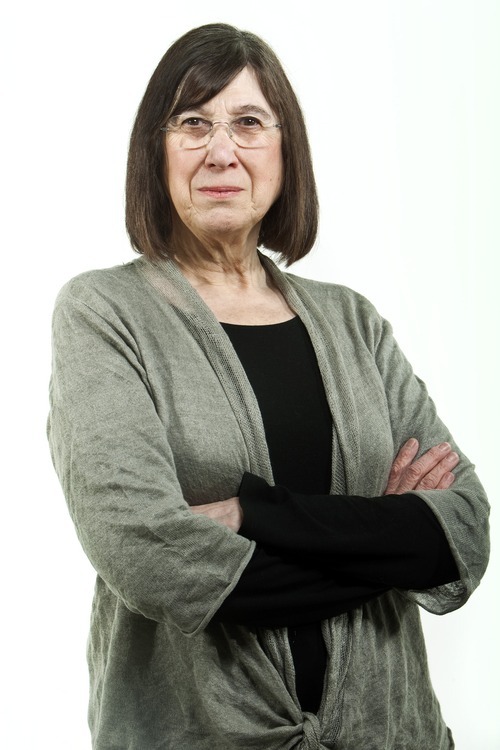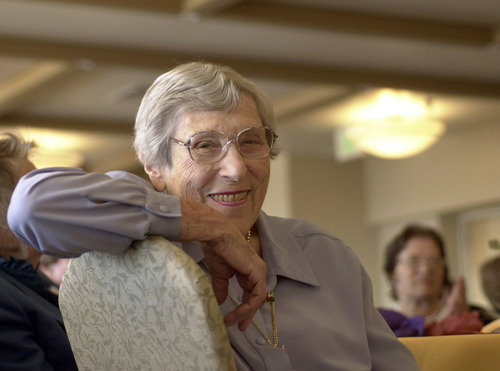This is an archived article that was published on sltrib.com in 2012, and information in the article may be outdated. It is provided only for personal research purposes and may not be reprinted.
Running for a third term as president in 1912, Theodore Roosevelt and his newly founded Progressive "Bull Moose" Party declared women to be "on a footing of complete and entire equal rights with man."
In Utah that year, an all-woman City Council and mayor governed the southern community of Kanab. And in Salt Lake City on Dec. 25, 1912, the future diplomat and activist, Esther Landa (nee Rosenblatt) was born to lead the women's movement.
Landa was the granddaughter of Polish-Jewish immigrant Nathan Rosenblatt, who with his sons developed the family business, Utah Junk Co., into an international mining, engineering and manufacturing corporation called EIMCO.
A tomboy who couldn't sew, Landa was encouraged by her parents to be responsible, to volunteer and give something back to the community. She graduated from East High School at 16, then went to Mills College in Oakland, Ca., where she learned women could do anything "if they set their mind to it," she told me some years back.
When Pearl Harbor was bombed in 1941, Landa went to Washington D.C., and became an information specialist for the Office of War Information. Two years later, she married her soldier, "Jerry," and started a family while effecting social change, a passion she pursued for more than 70 years.
"Esther was born a liberated woman with something to say and enough intelligence, wit and aggression to say it," said Wally Sandack, Utah's late but still beloved radio personality and former State Democratic Chairman. "She'd come back from something in Israel or Copenhagen and be off onto something else."
That "something" often involved issues pertinent to women's rights, children's welfare, public education, social services, family health, civil rights, cultural pluralism and human equality. By the 1970s, Landa had acquired local, national and international recognition. She was "as busy as a bird dog," as she put it.
Among myriad accomplishments, the longtime Democrat and political activist served on the Salt Lake Board of Education and was president both of the 1958 League of Women Voters and in 1975, the National Council of Jewish Women (NCJW). She received the 1967 Phi Delta Kappa's "Man of the Year" award, helped plan the 1971 White House Conference on Children and was a Utah delegate at the Conference on Families.
With like-minded community organizers Frances Dolowitz and Corrine Sweet, Landa co-founded the Utah children's educational program, Head Start.
She also presided at the Utah 1977 International Women's Year (IWY) Conference held at the Salt Palace. A precursor to the 1978 national convention set for Texas, IWY was initiated by the United Nations to examine discrimination, social and equity problems affecting women. Some 300 Utah feminists were expected. More than 13,000 Utah women and children, most of them Mormon, showed up to protest the proposed Equal Rights Amendment.
"I'll never forget it," advocacy leader Jinnah Kelson said last week. "They were afraid we [feminists] were going to change Utah and were out to stop us. Everybody was angry. It was Esther's deft facilitation of the group that pulled us through. Watching her handle the riled-up crowd and stormy debates was simply incredible."
Landa, attentive to everyone's point of view, never lost her temper "even when they were voting down issues close to her heart," Kelson said.
"Esther doesn't over-respond, burn out or bail out of situations," said former Utah congresswoman Karen Shepherd. "She just never gives up."
"Women have to be more active in politics and more interested in women's issues," Landa said in 1990. "Day care is not just a women's issue. It's a family issue. Pay equity is not just a women's issue. It's a human issue. Sexual harassment doesn't involve women alone. Planned Parenthood isn't for women only. Reproductive choice is not just a women's issue. We all need to pay attention to these issues."
Today, the resolute near-centenarian puts forth these same challenges; urging the time for equity and justice is now.
Happy Birthday, Esther.
Eileen Hallet Stone is an oral historian. She can be reached at ehswriter@aol.com.





